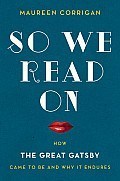Gatsby On and On
 Maureen Corrigan’s SO WE READ ON: HOW THE GREAT GATSBY CAME TO BE AND WHY IT ENDURES
Maureen Corrigan’s SO WE READ ON: HOW THE GREAT GATSBY CAME TO BE AND WHY IT ENDURES
So We Read On finds NPR critic and college professor Maureen Corrigan looking a each page, allusion and word of Fitzgerald’s masterpiece The Great Gatsby with the same hyper-focused, zeroed-in lenses that most scholars reserve for biblical studies or another analysis of a Shakespearean play. The difference here? Corrigan’s writing is hardly as stuffy, much more personal than the usual sterically academic read, thanks in no small part to Corrigan’s sheer, unabashed love for the novel.
Corrigan starts the book talking about the reason why most normal, still-intelligent adults don’t love Gatsby: they got forced into it in high school. Even worse, she says, they may have been introduced in junior high, at far to young an age to understand the satires and complexities of the novel. She admits to not loving it the first time as well, not getting just “why” this was a classic, and completely sympathizes with anyone who felt the same way, which is great for a reader like me who spent too much of my high school first- reading of the trying to remember every characters names (names are the worst things for me to remember, even now) and the colors of all the major objects in the novel, because that’s what a lot of the quizzes focused on back then. Next, Corrigan explains why, if you are one of those readers who fall into that very large boat, you must give the book a second go.
It’s funny – I’m not 100% sure who the target audience may be for this book. Fanatics or skepticals? Just more readers like me who love the lore the book holds and really, have read the book less times than they have read explorations of the history and context of the story? It’s a little hard to think that people already averse to the tale of Gatsby would willingly pick up a 300 page book delving further into that same story, but…. Maybe the best possible audience would be the folks that read it once, didn’t get it, don’t get the reason why this story has been remade into so many movies, taught in so many high school classes and just need to understand why this particular story is so resonating.
Of course, as a professor who has been teaching the story semester after semester to a group of college students (a much better age at which to be introduced to this great novel, she believes), she has plenty of insights into the novel thanks to the maybe hundred times she’s re-read the book. Among her theories and the things she wants you to notice about the book: the important roles water plays in the characters’ lives (especially Gatsby’s); how funny Fitzgerald meant this novel to be; and how, contrary to popular belief, it’s likely Daisy was based less on Zelda Fitzgerald and more on Scott’s first love.
Then, separating her from the strictly library-bound critic academics, Corrigan goes out into the field and really really digs for some new insights. She goes to a 7 hour reading of the entire novel, straight through. She delves into Scottie Fitzgerald (Scott and Zelda’s daughter) and the fight she undertook to keep her father’s papers and documents as an intact collection. She goes to the home of an old and somewhat eccentric collector of Fitzgerald documents and early manuscripts to dig through his personal archives, ultimately leaving with an internal debate over a single word that’s become illegible. She goes to a high school, watching students turn their own interpretations from the novel she loves so much.
Seriously though – if you have any interest in Fitzgerald – or even (and this is the guy I thought I loved more) his, as Corrigan reveals, frenemy Hemingway – be that an adoration for his work, a passing urge to revisit that high school read, or the desire for a little more background info on that Baz Luhrman film you just watched, by all means, check this out. It’s far more fun than the average academic companion.





